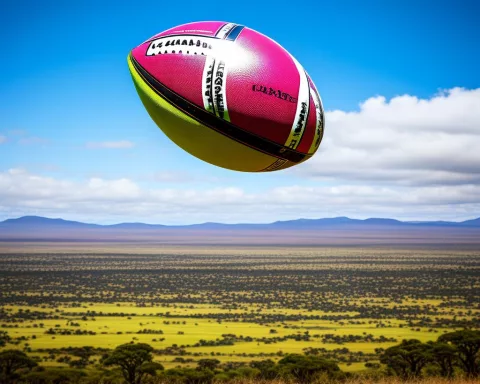Rugby players and coaches are expressing skepticism and frustration over the compulsory use of smart mouthguard technology in the sport. While the intention behind the technology is to improve player safety, it has faced disapproval due to its potential to disrupt the game’s flow and compromise player autonomy. Both players and coaches have raised concerns over the use of the technology, highlighting the need to strike a delicate balance between player safety and game integrity.
Why is there rising discontent in rugby world?
Players and coaching staff in the world of rugby are expressing skepticism and agitation over the compulsory use of World Rugby’s smart mouthguard technology. The new technology, designed to amplify player safety, has faced disapproval due to its potential to disrupt the game’s flow and compromise the players’ autonomy.
The world of rugby is witnessing an escalating wave of dissatisfaction over the compulsory use of World Rugby’s innovative smart mouthguard technology. Despite being a part of the technological advancements set to transform the sport, this particular evolution is facing skepticism and agitation from both players and coaching staff.
The cause of this dissent is the newly introduced smart mouthguards. The intention behind these is to amplify player safety by signaling medical experts on the ground when a player potentially suffers a head injury. Although the concept is intended to prioritize player safety, it is becoming a subject of heated debate among the primary stakeholders: the rugby players.
Disapproval among Players: Insights from Scott Barrett
Scott Barrett, the Crusaders’ captain, expressed his strong disapproval for the technology after his team’s 33-29 loss to the Waikato Chiefs. This championship kick-off in Hamilton, a rematch of the previous year’s finals, was the first crucial contest that mandated the use of these smart mouthguards.
In the course of the match, three principal players, including Crusaders’ lock Quinten Strange and the Chiefs’ backs Anton Lienert-Brown and Quinn Tupaea, were asked to leave the field when their mouthguards signaled warnings. The medical evaluations conducted on these players after their removal from the game, however, cleared them for play again, despite their initial confusion and the interruption to the game’s rhythm.
Barrett, a veteran All Black player, tagged the imposed exits of players during the game as disruptive, asserting that it could unfairly influence the game’s result. His apprehensions bring to light a critical issue: the potential for such technological safety measures to disrupt the game’s flow and compromise the players’ autonomy. “When key players are taken off the field and they’re unsure why, it can be quite frustrating for a player,” he commented.
Concerns among Coaches: Views from Clayton McMillan
These apprehensions were reverberated by Chiefs’ coach Clayton McMillan, who pointed out that the late-game exit of All Black back Lienert-Brown due to the smart mouthguard could have tipped the match’s outcome. McMillan expressed regret over the loss of strategic decision-making power that the mouthguard technology imposes on the team’s management.
These issues are not limited to the men’s rugby domain. In the previous year, this technology was tested during a women’s international competition in New Zealand. Players from the world champion Black Ferns team reported similar problems, stating that the mouthguards were significantly larger than usual, which obstructed their ability to breathe and communicate effectively on the field.
While the rationale behind the smart mouthguard technology – prioritizing player safety and welfare – is commendable, the practical implications of its deployment require careful deliberation. As the sport of rugby continues to progress and adapt in response to technological advancements, a delicate balance must be struck between player safety, game integrity, and the sport’s essence.
The introduction of World Rugby’s smart mouthguard technology marks a significant step in protecting player welfare. However, the resistance it has faced reveals a complex conflict between increased safety measures and their potential to disturb the game’s natural rhythm. The reactions of the players and coaches provide a valuable perspective into this ongoing discussion, underscoring the importance of aligning technological innovation with the preservation of the game’s inherent nature.
What is the smart mouthguard technology?
The smart mouthguard technology is a new innovation introduced by World Rugby to amplify player safety in the sport. The mouthguard signals medical experts on the ground when a player potentially suffers a head injury, allowing for quick treatment.
Why is there disapproval among players and coaches?
Players and coaches are expressing disapproval over the compulsory use of the smart mouthguard technology due to its potential to disrupt the game’s flow and compromise player autonomy. The technology imposes restrictions on strategic decision-making power and could unfairly influence the outcome of the game.
What are the concerns among players?
Players have reported feeling frustrated and confused when asked to leave the field due to warnings signaled by their mouthguards, even when medical evaluations clear them for play again. The interruptions to the game’s rhythm and the potential for unfair impact on the game’s result are also significant concerns.
What are the concerns among coaches?
Coaches have raised concerns over the loss of strategic decision-making power imposed by the mouthguard technology and its potential impact on the outcome of the game.
Has the technology been tested in women’s rugby?
Yes, the technology was tested during a women’s international competition in New Zealand. Players from the world champion Black Ferns team reported that the mouthguards were significantly larger than usual, obstructing their ability to breathe and communicate effectively on the field.
Is player safety still a priority in rugby?
Yes, player safety remains a top priority in rugby. However, as the sport progresses and adapts in response to technological advancements, a delicate balance must be struck between player safety, game integrity, and the sport’s essence.












